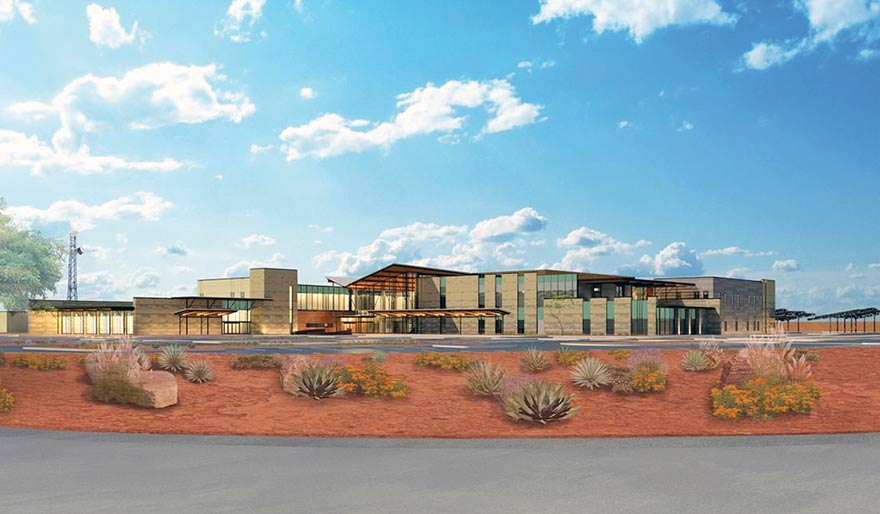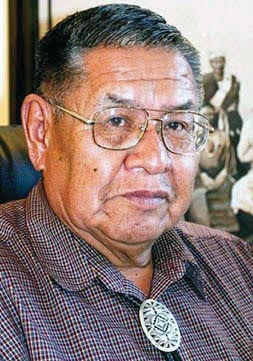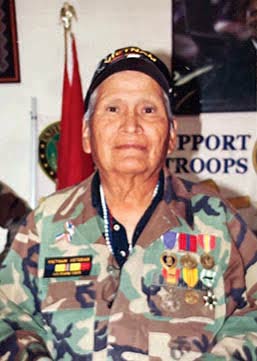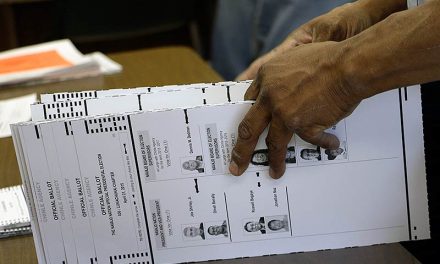
Capital Briefs | Construction of Dilkon Medical Center nearly complete

Courtesy photo
This artist’s rendering shows the planned Dilkon Medical Center, targeted for completion in 2022.
DILKON, Ariz.
Tribal and Indian Health Service officials on Monday toured the Dilkon Medical Center, the construction of which is 95% complete.

Courtesy photo
This artist’s rendering shows the planned Dilkon Medical Center, targeted for completion in 2022.
Joining President Jonathan Nez on the tour was Navajo Area IHS Director Roselyn Tso, Winslow Indian Health Care Center Inc. CEO Sally Pete and board member Alberto Peshlakai.
They looked over ongoing construction work of 109 staff quarters and housing units that will be completed by September to house staff and medical personnel.
Ground was broken for the new facility on June 25, 2019. Construction was delayed due to global supply chain issues and demand for construction material.
Construction is nearly two years ahead of schedule and the community is expected to host a grand opening ceremony for the new 154,000 square-foot facility in July, with medical services opening to patients in August.
Due to the COVID-19 pandemic, the facility includes specially-built isolation rooms that allow patients to be separated from others to lower the risks associated with the virus.
Solar panels have been installed on the roof of the facility to lower energy costs. Throughout the center, rooms are designed to maximize the benefits of natural lighting.
Daniel Peaches passes away April 5

Daniel Peaches
WINDOW ROCK – Navajo Nation leaders offered condolences to the family, friends and colleagues of Daniel Peaches, who passed away on April 5 at the age of 82. Funeral services were held Friday in Black Mesa.
He was Tódich’iinii (Bitter Water Clan), born for T?’ízí ?ání (Many Goats Clan), and was originally from Kayenta.
Among many leadership roles, Peaches was elected as a Republican to the Arizona State House of Representatives in 1974. He served five terms in the Legislature until he lost a reelection bid in 1984.
He was elected as a delegate on the Navajo Nation Council in 1999.
Prior to becoming an elected leader, he served in many prominent roles such as director of public information under former Navajo Tribal Chairman Peter MacDonald. He also served as entrepreneurial coordinator with Leupp School, deputy director of the Navajo Nation Ethics and Rules Office, chapter coordinator for Chilchinbeto Chapter, community liaison for the Black Mesa Review Board, and town manager for the Kayenta Township from 2006 to 2008.
He served as chairman of the Arizona Commission on Indian Affairs in 1971, was a member of the National Advisory Council on Indian Education, and served on the Navajo Community College Board of Regents in 1988.
In 1974, he was appointed by President Richard Nixon as chairman of the National Advisory Council on Indian Education.
He advocated for tribal communities and schools throughout the country and served for six terms – 35 years – on the Navajo County Community College Governing Board.
He graduated from Northern Arizona University in 1967 and earned a master’s degree in public administration.
Kayenta Delegate Nathaniel Brown said, “Mr. Peaches was a practicing medicine man who helped many families – a healer our Nation has lost. We express our deepest condolences to the Peaches family and may our prayers keep them strong.”
Flags at half-staff for Purple Heart veterans

Dan Y. Begay
WINDOW ROCK – On April 8, all Navajo Nation flags were ordered to be flown at half-staff on Saturday, April 9, in honor and remembrance of Diné Purple Heart veteran Dan Y. Begay, who passed away on April 5 at the age of 78.
He was Tsé deeshgizhnii, born for Naakai Dine’é and was originally from Forest Lake, Ariz.
He served in the U.S. Marine Corps during the Vietnam War and was awarded three Purple Hearts for service in combat.
Following his military service, Begay served as the vice president and president of Forest Lake Chapter. He was also an electrician and worked in the social services field.
He was laid to rest in a private family service on Saturday at the family plot in Forest Lake.
Refunds for those who financed vehicles at Tate’s Auto
WINDOW ROCK – The Navajo Nation Human Rights Commission announced last week that the Federal Trade Commission is planning to send payments to more than 3,000 people who financed a car or truck at a Tate’s Auto dealership after Jan. 1, 2013, and later had the vehicle repossessed.
According to an FTC lawsuit, Tate’s Auto lied to lenders about people’s income and down payment amounts. Many people got loans they couldn’t afford to pay back.
Tate’s Auto agreed to pay $450,000 to settle the charges. The FTC plans to use the settlement money to provide refunds.
On April 7 the Navajo Nation Human Rights Commission announced the FTC has hired JND Legal Administration to oversee the refund process.
JND Legal Administration will send emails to people who are eligible for the refund. The email address TatesAuto@jndla.com is the official email that will be sent out with information on how to receive the refund.
If you receive an email, the FTC recommends that you follow the instructions. The email will provide options of receiving a physical check or to have it delivered via PayPal.
‘Light Up Navajo’ companies, crews thanked
WINDOW ROCK – On April 7 Navajo Tribal Utility Authority officials held an appreciation event in Chinle to thank utility companies that are participating in NTUA’s “Light Up Navajo III” initiative.
The initiative invites volunteers from companies across the country who work to extend powerlines to provide electricity to Navajo families.
Light Up Navajo began in 2019 and connected 230 homes to the electric grid in the first year.
Due to the COVID-19 pandemic, the initiative was put on hold, however, NTUA successfully connected 737 homes to the electric grid using CARES Act funds in 2020.
Beginning this month, 17 utility companies and organizations from 11 states, including Arkansas, Arizona, Delaware, California, Connecticut, North Carolina, New Mexico, Ohio, Washington, Texas, Utah, and Washington D.C., are working toward the goal of connecting 300 homes within 10 weeks.
As of April 7, 14 homes were connected.
Families that recently received electricity shared personal experiences and the challenges they’ve faced living for many years without electricity.
President Jonathan Nez said, “NTUA employees were out in the communities during the height of the pandemic, day after day working long hours to get more water, electricity, and broadband services to our people – they made a difference in the lives of many of our people.
“During the event, families who recently received electricity were also in attendance and shared their personal experiences and challenges that they’ve faced living many years without electricity. They also offered their heartfelt appreciation to the utility workers and the Navajo Nation.
Light Up Navajo is a collaboration between NTUA and the American Public Power Association.
“With the support of the leadership of the Navajo Nation,” Nez added, “NTUA continues to connect the homes of our families to the electric grid. We are proud of the work being done and we look forward to seeing more Navajo homes connected with the continued partnership success of Light Up Navajo III.”
Federal law provides funding to build climate resilience in tribal communities
WASHINGTON — The Department of the Interior announced Monday it is investing $46 million in funding for tribal communities to confront the unique impacts of climate change, according to an Interior news release.
This initial funding is made available by President Biden’s Bipartisan Infrastructure Law and fiscal year 2022 appropriations.
As the affects of climate change intensify, Interior Secretary Deb Haaland said, “Coastal communities are facing flooding, erosion, permafrost subsidence, sea level rise, and storm surges, while inland communities are facing worsening drought and extreme heat.”
The department is accepting proposals from tribes and tribal organizations as part of the Bureau of Indian Affairs Tribal Climate Resilience Program.
The Bipartisan Infrastructure Law provides a total of $466 million to the Bureau of Indian Affairs over five years, including $216 million for climate resilience programs.
Of that funding, $130 million is provided for community relocation, $86 million is provided for tribal climate resilience and adaptation projects, and $43.2 million will be available to spend annually for five years.
Monday’s announcement is supported by $21.7 million from Bipartisan Infrastructure Law funding and $24.5 million from fiscal year 2022 annual appropriations.
An informational webinar hosted by the Institute for Tribal Environmental Professionals Tribes and Climate Change Program on the funding opportunity is scheduled for April 25, from 1:30 p.m. to 3 p.m. (MT).
U.S. Senate OK’s Shadow Wolves bill
SELLS, Ariz. – On April 5, the U.S. Senate passed legislation that will improve recruitment and expand operations for the Shadow Wolves, the country’s only Native American tracking unit.
The bill (H.R. 5681) was previously passed the U.S. House on March 10 and will now go to President Joe Biden to be signed into law.
The Shadow Wolves are an all-Native American tactical patrol unit within U.S. Immigration and Customs Enforcement operating on the Tohono O’odham Nation’s reservation, which shares 62-miles of international border with Mexico.
These law enforcement officers utilize traditional tracking methods to assist in disrupting and dismantling drug trafficking organizations.
Established in 1974, the Shadow Wolves have helped protect the U.S. homeland and the Nation for nearly 50 years.
Under current law they are currently classified as tactical officers rather than special agents. This classification has hampered effectiveness and viability.
The bill would reclassify the Shadow Wolves as ICE special agents as well as encourage recruitment and expansion of the program.
Tohono O’odham Nation Chairman Ned Norris, Jr. said, “The Shadow Wolves utilize traditional indigenous knowledge and skills to protect our O’odham citizens and the United States from cartels and other criminal activity in the region.”








 Highway 264,
Highway 264, I-40, WB @ Winslow
I-40, WB @ Winslow